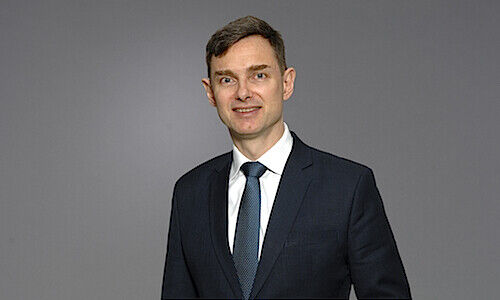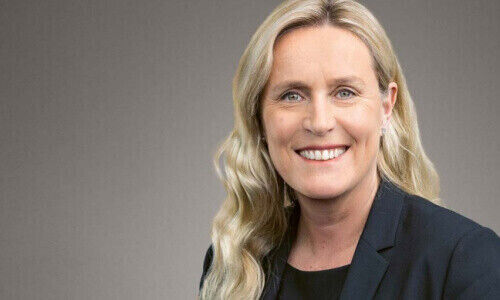Max Martin: «Three Humanitarian Impact Opportunities»
While humanitarian needs are increasingly growing, the donor base is narrow and the funding gap is widening. Nonetheless, there are potential solutions and Dr. Maximilian Martin highlights three opportunities to realign impact in his essay for finews.first.
finews.first is a forum for authors to comment on economic and financial topics.
In the 2020s, humanitarian needs are increasing dramatically. Humanitarian crises are now affecting most continents. The Global Humanitarian Overview (GHO), published by the UN Office for the Coordination of Humanitarian Affairs and probably the best evidence-based assessment of humanitarian needs around the world, estimates that in 2024, $46.1 billion will be necessary to assist 184.1 million people in need via 36 co-ordinated response plans covering 73 countries.
Asia and the Pacific face a host of pressing humanitarian needs as well. For example, a whopping 23.7 million people in Afghanistan need humanitarian assistance and 7.3 million need humanitarian aid. We are also starting to see the impact of climate change on populations: in Mongolia, climate change has rendered very harsh winters – also known as «dzud» – more frequent and more severe, with temperatures dropping to minus 30 degrees Celsius or lower, bringing along fierce winds, heavy snow and ice. Right now, 200,000 vulnerable Mongolian herder families and other persons are in need of humanitarian assistance.
«[F]unding and efficiency remain the most pressing challenges
Unfortunately, the humanitarian response plans in these countries are only partially funded. In most other countries around the world suffering from conflict or natural disasters, the challenge is similar: funding and efficiency remain the most pressing challenges. At the same time, the global donor base remains narrow: a handful of governments provide more than 80 percent of all aid funding, and the funding gap is widening.
The humanitarian community is therefore increasingly enlisting the private sector to provide funds as well as its expertise to find new ways of addressing humanitarian needs. We see three areas of opportunity where the private sector can play a key role in innovating and driving greater impact for humanitarian action.
«Historically, the humanitarian supply chain was seen as akin to a back office function»
First, one major opportunity is to raise service and capital efficiency by strategically involving the private sector in solution provision. Humanitarian actors command a wealth of expertise to respond on the ground, as well as the passion to make things work in extremely challenging settings. In a context where the growth of humanitarian needs exceeds that of funding allocations, increasing efficiency will be critical.
Historically, the humanitarian supply chain was seen as akin to a back office function, which would be considered later on in the programmatic cycle, despite accounting for 60 to 80 percent of humanitarian aid funding! Looking forward, humanitarian supply chains are now being reconceptualized as one lever among many to address the funding gap, and the financial impact could be massive.
«This debate has now moved on»
Second, attracting more private investment has the potential to contribute in important ways to addressing humanitarian needs. One example is Lombard Odier’s collaboration with the International Committee of the Red Cross (ICRC) to design and bring to market the Program for Humanitarian Impact Investment (PHII, also known as the «humanitarian impact bond»).
Only a few years ago, it was hotly debated whether or not new models to foster greater collaboration between private investors and humanitarians on the ground were really needed. This debate has now moved on. The sense that new avenues for capital investment can be instrumental in driving economic opportunities in fragile and thus risky environments is overwhelmingly shared.
We have graduated to the «how-to» questions: when factoring in all costs and the ability to mobilize capital, what are the most effective de-risking possibilities to make borrowing cheaper in fragile contexts (including the development of tools such as guarantees)? How can opportunity pipelines of projects that are both bankable and have a strong humanitarian impact be developed efficiently? Which new investment instruments are helpful, and which ones are rather a distraction once cost and effort are properly accounted for?
«Put differently, a perfect storm is also an opportunity to retool in fundamental ways»
Finally, the good news is that moving forward from the experience of impactful but ultimately pilot projects to a more strategic approach across the board to unlock supply chain efficiencies and stimulate private investment is now becoming possible. But this needs to be complemented with additional innovation.
For example, while all airplanes and ships have black boxes and transponders installed, to date, no similar technology has been put to work to track the impact of conflict on key civilian infrastructure such as hospitals or schools. Technologies such as this could make significant contributions in conflict scenarios by establishing dramatically greater accountability and transparency, particularly if combined with sustainable economic solutions that reduce people’s reliance on urgent relief over time, and the extra bang for the buck delivered by ultra-efficient humanitarian supply chains during emergency response.
Put differently, a perfect storm is also an opportunity to retool in fundamental ways. The time is now right for the many talented and passionate professionals in the humanitarian sector, their funders, and their partners to offer the fresh solutions that millions of people whose lives are disrupted by conflict are waiting for.
Dr. Maximilian Martin is the Global Head of Philanthropy at Lombard Odier Group.
Previous contributions: Rudi Bogni, Peter Kurer, Rolf Banz, Dieter Ruloff, Werner Vogt, Walter Wittmann, Alfred Mettler, Robert Holzach, Craig Murray, David Zollinger, Arthur Bolliger, Beat Kappeler, Chris Rowe, Stefan Gerlach, Marc Lussy, Nuno Fernandes, Richard Egger, Maurice Pedergnana, Marco Bargel, Steve Hanke, Urs Schoettli, Ursula Finsterwald, Stefan Kreuzkamp, Oliver Bussmann, Michael Benz, Albert Steck, Martin Dahinden, Thomas Fedier, Alfred Mettler, Brigitte Strebel, Mirjam Staub-Bisang, Nicolas Roth, Thorsten Polleit, Kim Iskyan, Stephen Dover, Denise Kenyon-Rouvinez, Christian Dreyer, Kinan Khadam-Al-Jame, Robert Hemmi, Anton Affentranger, Yves Mirabaud, Katharina Bart, Frédéric Papp, Hans-Martin Kraus, Gerard Guerdat, Mario Bassi, Stephen Thariyan, Dan Steinbock, Rino Borini, Bert Flossbach, Michael Hasenstab, Guido Schilling, Werner E. Rutsch, Dorte Bech Vizard, Katharina Bart, Maya Bhandari, Jean Tirole, Hans Jakob Roth, Marco Martinelli, Thomas Sutter, Tom King, Werner Peyer, Thomas Kupfer, Peter Kurer, Arturo Bris, Frederic Papp, James Syme, Dennis Larsen, Bernd Kramer, Armin Jans, Nicolas Roth, Hans Ulrich Jost, Patrick Hunger, Fabrizio Quirighetti, Claire Shaw, Peter Fanconi, Alex Wolf, Dan Steinbock, Patrick Scheurle, Sandro Occhilupo, Will Ballard, Nicholas Yeo, Claude-Alain Margelisch, Jean-François Hirschel, Jens Pongratz, Samuel Gerber, Philipp Weckherlin, Anne Richards, Antoni Trenchev, Benoit Barbereau, Pascal R. Bersier, Shaul Lifshitz, Klaus Breiner, Ana Botín, Martin Gilbert, Jesper Koll, Ingo Rauser, Carlo Capaul, Markus Winkler, Thomas Steinemann, Christina Boeck, Guillaume Compeyron, Miro Zivkovic, Alexander F. Wagner, Eric Heymann, Christoph Sax, Felix Brem, Jochen Moebert, Jacques-Aurélien Marcireau, Ursula Finsterwald, Michel Longhini, Stefan Blum, Zsolt Kohalmi, Nicolas Ramelet, Søren Bjønness, Gilles Prince, Salman Ahmed, Peter van der Welle, Ken Orchard, Christian Gast, Jeffrey Bohn, Juergen Braunstein, Jeff Voegeli, Fiona Frick, Stefan Schneider, Matthias Hunn, Andreas Vetsch, Fabiana Fedeli, Kim Fournais, Carole Millet, Swetha Ramachandran, Thomas Stucki, Neil Shearing, Tom Naratil, Oliver Berger, Robert Sharps, Tobias Mueller, Florian Wicki, Jean Keller, Niels Lan Doky, Johnny El Hachem, Judith Basad, Katharina Bart, Thorsten Polleit, Peter Schmid, Karam Hinduja, Zsolt Kohalmi, Raphaël Surber, Santosh Brivio, Mark Urquhart, Olivier Kessler, Bruno Capone, Peter Hody, Michael Bornhaeusser, Agnieszka Walorska, Thomas Mueller, Ebrahim Attarzadeh, Marcel Hostettler, Hui Zhang, Michael Bornhaeusser, Reto Jauch, Angela Agostini, Guy de Blonay, Tatjana Greil Castro, Jean-Baptiste Berthon, Marc Saint John Webb, Dietrich Goenemeyer, Mobeen Tahir, Didier Saint-Georges, Serge Tabachnik, Vega Ibanez, David Folkerts-Landau, Andreas Ita, Michael Welti, Fabrizio Pagani, Roman Balzan, Todd Saligman, Christian Kaelin, Stuart Dunbar, Carina Schaurte, Birte Orth-Freese, Gun Woo, Lamara von Albertini, Ramon Vogt, Andrea Hoffmann, Niccolò Garzelli, Darren Williams, Benjamin Böhner, Mike Judith, Jared Cook, Henk Grootveld, Roman Gaus, Nicolas Faller, Anna Stünzi, Thomas Höhne-Sparborth, Fabrizio Pagani, Guy de Blonay, Jan Boudewijns, Sean Hagerty, Alina Donets, Sébastien Galy, Roman von Ah, Fernando Fernández, Georg von Wyss, Stefan Bannwart, Andreas Britt, Frédéric Leroux, Nick Platjouw, Rolando Grandi, Philipp Kaupke, Gérard Piasko, Brad Slingerlend, Dieter Wermuth, Grégoire Bordier, Thomas Signer, Gianluca Gerosa, Christine Houston, Manuel Romera Robles, Fabian Käslin, Claudia Kraaz, Marco Huwiler, Lukas Zihlmann, Sherif Mamdouh, Harald Preissler, Taimur Hyat, Philipp Cottier, Andreas Herrmann, Camille Vial, Marcus Hüttinger, Serge Beck, Alannah Beer, Stéphane Monier, Ashley Simmons, Lars Jaeger, Shanna Strauss-Frank, Bertrand Binggeli, Marionna Wegenstein, George Muzinich, Jian Shi Cortesi, Razan Nasser, Nicolas Forest, Joerg Ruetschi, Reto Jauch, Bernardo Brunschwiler, Charles-Henry Monchau, Philip Adler, Ha Duong, Teodoro Cocca, Beat Wittmann, Jan Brzezek, Florin Baeriswyl, Nicolas Mousset, Beat Weiss, Pascal Mischler, Andrew Isbester, Konrad Hummler, Jan Beckers, Martin Velten, Katharine Neiss, Claude Baumann, Daniel Roarty, Kubilay Yalcin, Robert Almeida, Karin M. Klossek, Marc Taverner, Charlie T. Munger, Daniel Kobler, Patrick Stauber, Colin Vidal, Anna Rosenber, Judith Wallenstein, Adriano Lucatelli, Daniel Goleman, Val Olson, Brice Prunas, Francesco Magistra, Brigitte Kaps, Frances Weir, Luis Maldonado, Francesco Mandalà, Francesco Magistra, Nadège Lesueur-Pène, Massimo Pedrazzini, Eric Sarasin, David Ellis, Dina Ting, Christopher Gannatti, Shaniel Ramjee, Mihkel Vitsur, Nannette Hechler-Fayd’herbe, and Ralph Ebert.



























